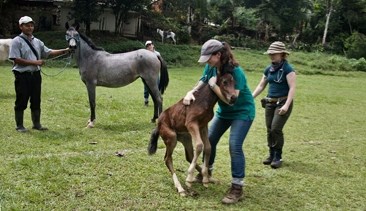INNISFAIL – When local vet Dr. Katarina Purich travelled to Costa Rica this January it was no tropical resort vacation.
Instead, the mixed-practice veterinarian, who joined Poplar Grove Veterinary last year, spent her time in remote and rural locations in the country, roughing it almost every night and helping care for equines as part of a roving, temporary vet clinic.
"I just like being involved in the horse community in Alberta, and this was a way for me to give back,” she said.
She has a love of horses, including 15 years in show jumping and other equine-related activities.
In 2016 she went to an equine conference in B.C. and received a scholarship to join the Equitarian Initiative workshop in Costa Rica.
In 2017, she went -- one week with the workshop, and then a second in the field -- providing relief veterinary services in some of the southern reserves of Costa Rica.
She worked as part of a team of 12 people, including eight vets. The nights were often spent at a community building or in someone’s house, which were not luxury accomodations, and the days spent administering care to horses and other equines that extended from de-ticking to gelding.
Several of the 2017 team returned for this year’s project, covering some old ground and some new.
"Many of the horses have never, ever seen a veterinarian,” Purich said.
In Costa Rica horses are an essential part of the transportation network, including helping with the coffee harvest.
The Equitarian Initiative does this and other similar projects in several countries, and in this case paired up with the Costa Rica Equine Welfare group.
In addition to the international vets and vet students, Costa Ricans travelled with the group to do farrier work, like feet or saddle fit, and to help teach people who come to the clinics on how to care for their horses in non-veterinary ways.
Purich said they also tried to educate people about purchasing products as a group for deworming or getting rid of parasites, making it more economical for the community, but also to help extend the horses’ lives.
It might not have been a luxury vacation, but Purich’s got a taste for this kind of work.
"They’re super addictive, actually,” she said. She said it helped reinforce why she became a vet in the first place.
"I would like to make this a yearly thing for myself,” she said. The young vet paid out of her own pocket for this recent trip.
Many of the Equitarian Initiative’s projects are paid for by the vets themselves and contributions from clients, said Dr. Neil Gray, the project leader for the Costa Rica trip and a director of the Equitarian Initiative.
In an interview from L.A., where Gray is based, he said the projects are a great way to give back to the horse community, and echoed Purich’s sentiments about it reinforcing why he became a vet.
He invited Purich to return to the project for a couple of reasons.
"She’s a really good vet,” Gray said. But another reason is the conditions of the trip mean the volunteers aren’t coddled in any way, and it’s closer to camping than a resort holiday.
"The group dynamic on these trips becomes very important,” he said. "It takes a certain personality that can enjoy … Kat(arina) fits right in.”
Dr. Katarina Purich
"I just like being involved in the horse community in Alberta, and this was a way for me to give back. Many of the horses have never, ever seen a veterinarian."



